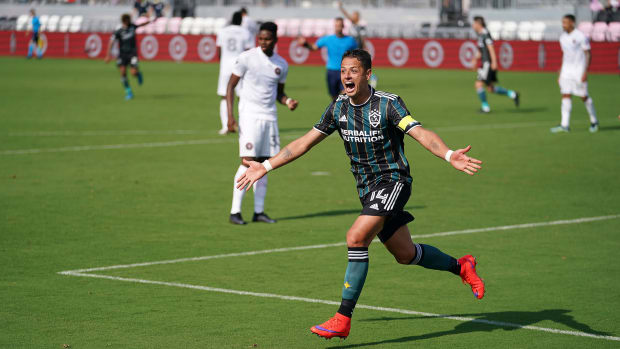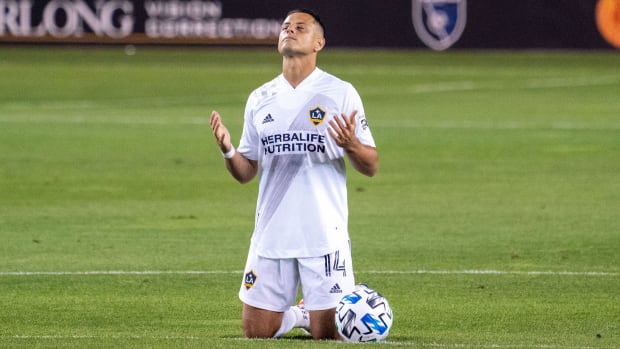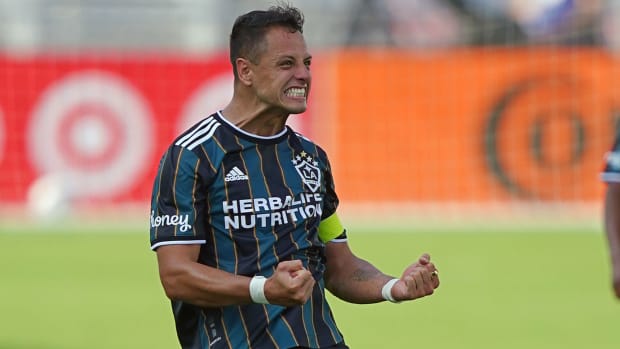The LA Galaxy star is baring his soul and showcasing his flaws and vulnerability as he commences the climb from the depths of an adversity-filled 2020.
There was no way those goals and that moment were rehearsed, planned or scripted. Say what you will about MLS pulling strings for the big boys—that was Inter Miami’s home opener. There was a crowd, and among the fans in the stands were co-owner David Beckham and his buddy Tom Brady. Nobody was going to just hand the narrative over to Javier Hernández. He’d have to earn it—seize it after what must have felt like an endless stretch of failure and misfortune. And so he did.
The sincerity of LA’s reaction to his two goals, the celebration following a 3–2 win and his tears in the postgame interview spoke to the genuineness of the occasion. Sunday was a long time coming. The man called ‘Chicharito’ was back. Following a disastrous 2020 season during which life, his body and the sport seemed to turn against him, Hernández had willed himself back toward the summit. Humility, recognition, responsibility and vulnerability were the cornerstones of his journey, and while it’s far from over, last weekend’s game was a welcome sign that he’s on the right track.
“It’s very rare in life when you are not very well prepared that things come out very positive and come along in a very beautiful way, you know? Hard work is something that always pays off sooner or later,” Hernández told Sports Illustrated this week. “The goals, the result, it was just a reminder to the whole organization when we take responsibility, when we improve, when we learn from all the lessons when you are not doing well, those are the rewards.”

His arrival in MLS was long-rumored and long-awaited, and when Hernández finally signed with LA following a $9.4 million transfer from Sevilla in January 2020, many figured that Mexico’s all-time leading scorer—a former Premier League winner with Manchester United who was still only 31 years old—would feast on the young U.S. league. Instead, 2020 nearly ate him alive. He struggled with significant injuries and fitness, and with the isolation imposed by the pandemic. His beloved grandfather, Tomás Balcázar, a Chivas de Guadalajara legend with whom Hernández was very close, died in April. He was separated from his wife and children and left to grieve alone, all while the Galaxy’s season went off the rails. Hernández scored a paltry two goals as LA missed the playoffs again and coach Guillermo Barros Schelotto was fired. It was a year-long waking nightmare.
Hernández has called it “rock bottom.” He was cut down to the foundation and there, he discovered his essence. He figured out how to start the climb.
“Perspective, connection with myself, getting back to basics. And the basics is like, I’m human. I’m Javier. Knowing who I am, accepting my light and my shadow and from there, just connect so I can be more present every single day, every moment, and enjoy and create the life that I want and that I deserve,” he said of his turning point.
“I took responsibility for my life. In a way, I was angry with life. Why did you take my grandfather? Why is coronavirus happening? Why, why, why? And then I changed. Instead of [asking] why these things are happening, it’s for what reason they’re happening to me. What can I take from all those things so I can improve, so I can grow? That’s responsibility,” he continued. “It’s harder being the best version of yourself. It’s harder than staying in your comfort zone.”
A big reason for Hernández’s massive popularity has been his passion. He is 90 minutes of emotion, a heart-on-your-sleeve sort of player who brings a fan’s ferocity and investment to the field. But that passion comes with a bit of risk: you make yourself vulnerable if you allow yourself to feel with such intensity. Everything hits hard. Everything has the capacity to exhaust, wound or inspire. It’s like going to battle without armor. Hernández said he realized that feeling with depth took courage—and from courage comes strength. That was his ticket.

“I cry a lot. I cry of happiness. I cry of anger. I cry of whatever. It’s an expression that I have, and through time I worried about it because society tell you that’s weakness, [but] what I realized is people think that it’s so easy to criticize someone that is getting exposed,” he said. “I believe you need to have balls to expose yourself. I wasn’t giving myself credit. … When you show yourself, it’s more brave than just holding back.”
A significant part of his regimen revolved around a commitment to dig deep and rebuild his athletic, nutritional and mental foundation. Get stronger in all ways, because past achievements, goals and trophies weren’t going to benefit the Galaxy. Hernández said on a recent episode of Alexi Lalas’s State of the Union podcast that he now employs a fitness coach, a nutritionist who plans all his meals, a martial arts coach and an “emotional coach.” He does extra fitness sessions and even sleeps sometimes in a hyperbaric chamber.
But another key part was embracing that exposure and vulnerability. Almost any question, almost every topic, in a conversation with Hernández veers into an examination of the universal nature of humanity. Fame and wealth are a veneer or shield, he argued, that don’t erase or perfect the person underneath.
“There’s nothing that is going to separate myself from struggles that all humans have,” he told Sports Illustrated. “Self-growth, emotional growth, it’s not a place to arrive. It’s a constant process that is never going to end until you die.”
That common bond he feels with others, the people in the stands and on the streets who struggle and strive in their own lives, is uniquely empowering. Hernández wants to bare his soul, show off his scars and reveal his flaws—all while reveling in the strength he derives from the courage required to do so. Vulnerability is fuel. He’s turned rock bottom into a launch pad.
“I felt in a very good way, exposing myself on my social media in that way that I want because sometimes people don’t see what athletes do behind the scenes,” he said. “Bad moments happen. But without those bad moments, Chicharito wouldn’t be here. Chicharito wouldn’t happen. … Of course we always want to be as great as possible, as good as possible, and maintain that every single day. But we are humans. That’s the beauty of it, that we are humans—that we are not perfect.”
He continued, “If I can help people just being myself, I just want to be, as much as I can, myself in this position, so people can dare to be themselves—no matter the job or the life that they are in.”
It’s tough to consider Hernández and hear him talk about his commitment to the Galaxy and desire to deliver his best and healthiest self to his team without thinking of a predecessor and long-time rival, Landon Donovan. They were the faces of their respective national teams for years, and now they have a club and a cause in common.
Donovan, of course, spoke eloquently toward the end of his career and beyond about the importance of mental well-being and about the relief and sense of empowerment that flows from authenticity. Their shared desire to convey that athletes are more than robots that never fail, or surrogates for the ambitions of others, bind them in a fascinating way, lending credence to Hernández’s contention that we’re all the same underneath the jersey—whether that jersey is white or green.
Hernández said he had the opportunity to speak with Donovan ahead of a preseason friendly between the Galaxy and San Diego Loyal in March.
“We played so many times together like we know each other, of course, but we are not that close. But that conversation we had, it felt like [we knew each other] because I think the energy, without saying stuff, we already understand each other in a way. A part of that is we have so many coincidences. When someone gives credit to that and identifies that part of the human and emotional work, it’s easier to connect with other people, with any people around the world,” Hernández said. “He gave me that space to open up in a way. … I was being myself and he felt that.”
If Hernández can connect with Donovan, then perhaps he’s on his way to making an impact on American soccer that’s distinct from his nationality. There are, of course, millions of fans in the U.S. with affection for El Tri. For so many others, Hernández was the antagonist. But that was just a role, he said.
“If you’re not in my team, I’m not going to hate you. I want to beat you. It’s part of the game. But the whistle blows and it ends, and I see you’re a human and we have a good connection,” he said.

The five-time champion Galaxy aren’t the juggernaut they used to be. Six seasons without winning at least a conference title is by far the longest streak in team history, and they’re not yet considered a 2021 MLS Cup contender. But they’re still far from a sympathetic story for most. LA’s vast resources and years of dynastic success will do that. Hernández, however, may be emerging as an individual who’s kind of hard to root against, which says a lot for a Mexican legend playing north of the border.
The raw emotion he displayed after scoring twice against Miami, tears welling up in his eyes as he thanked his club for its faith in him and dedicated his goals to his family, was the sort of thing that might make someone forget the jersey and embrace the human instead. He clearly cared—there were early concerns he regarded MLS as the first step toward retirement—and he knows that results from here on out will be a reflection of his commitment. There’s genuine pressure that comes with his pedigree and that paycheck. He can still shape his legacy.
“Even big players, even players that have achieved a lot, they still need a certain confidence level and believing that things are going to go their way, and then they’ll get into a flow of better results,” Galaxy GM Dennis te Kloese said as Hernández struggled last year. “He’s grown also as a human being and as a person. And I think part of turning this around is a lot that he’ll have to put into it. He’ll have to put in a lot of effort and energy, which he has more than enough."
There will be fans back at Dignity Health Sports Park on Sunday as LA hosts the New York Red Bulls in a nationally televised home opener. Last year didn’t feel real, with ghost games staged inside empty stadiums and Hernández playing like a shadow of his former energized and effective self. This Sunday represents the opportunity for a reintroduction, as if the world and the player are healing.
Then it’s time to deliver. Hernández has found his way back. He focused on himself, and now he’s convinced he’s ready to contribute to the collective. The Galaxy will rely on him to help return the club to where it believes it belongs.
“It’s a sport and of course there’s that pressure. Of course we went to play for the fans. We want to deliver [for] the fans as good as we can. It’s obvious. It’s always been like that and this country has it,” he said. “There’s nothing else in my mind. There’s nothing else. I’m working as hard as I can to achieve that, to make what I’m visualizing for myself, make it real … to try to get through, get through, get through until we can lift the trophy. That’s what I want. I want to be part of the sixth trophy and star of this badge.”
More Soccer Coverage: